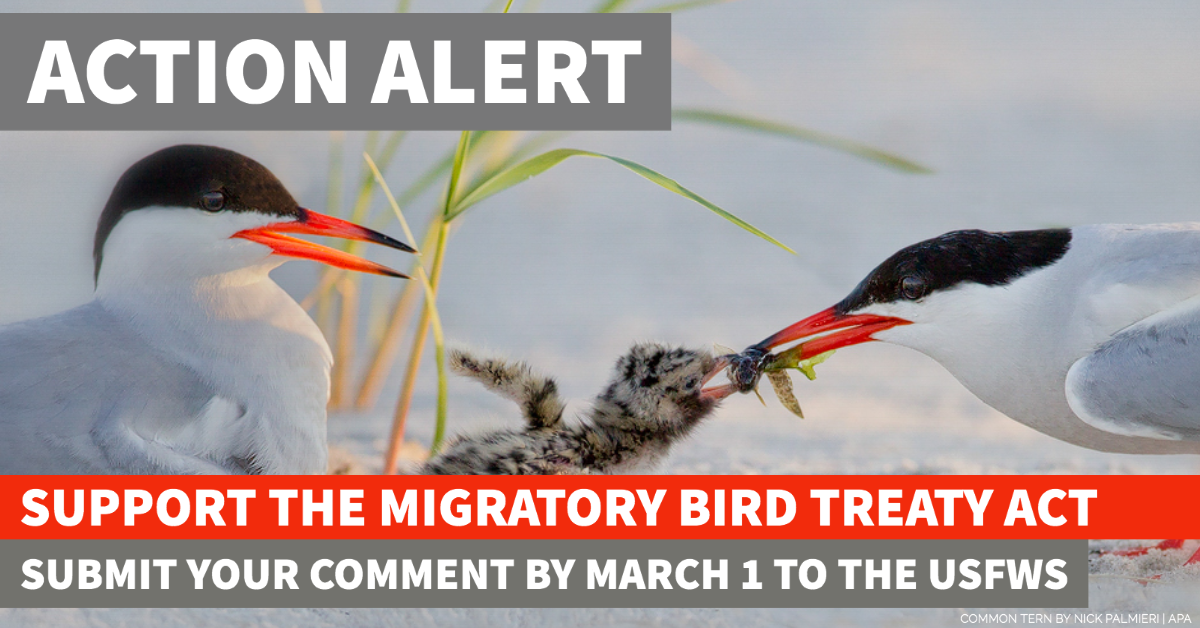It’s been just over a year since the Trump administration proposed a rule that would significantly undercut a century-old bird-protection law in the United States, the Migratory Bird Treaty Act of 1918, or MBTA. This rule — originally scheduled to go into effect on Feb. 8 — would give the no-consequences green light to infrastructure and industry, from big oil to wind, power lines, and pollution. The rule would not penalize industries for any incidental killing (“incidental taking”) of birds related to the industry’s respective activities, stripping the MBTA from its inherent power and purpose to protect birds.
President Joe Biden’s administration has announced it will be delaying the implementation of Trump’s rule that would exempt companies and people from prosecution over unlawful deaths of protected birds.
Just a few days before that rule was set to take effect, in a Feb. 5 email, the U.S. Department of the Interior released a statement calling Trump’s MBTA rule “misguided,” validating the importance of reassessing the law’s recent rollback at a critical time for bird populations.
“The Migratory Bird Treaty Act is a bedrock environmental law critical to protecting migratory birds and restoring declining bird populations,” wrote Melissa Schwartz, a spokesperson for the Department. “The Trump administration sought to overturn decades of bipartisan and international precedent in order to protect corporate polluters. At President Biden’s direction, [the Department of the] Interior is delaying and reviewing the Trump administration’s rollback of the MBTA to ensure continued progress toward common-sense standards that protect wildlife and their habitats.”
We have a small window of time to offer input for the new administration to consider in their critical review of what policies best protect birds — let’s make it count.
Submit Your Comment HERE Before March 1***
***While groups may coordinate and circulate petitions and social media campaigns to generate public awareness and the like, we urge you to submit your public comment directly to the Department of the Interior to ensure that your voice for birds is heard!
~ by Heather Good, executive director
Join the Voices of Michigan Audubon
“This law carries with it more than a century of knowledge, scientific data gathered from monitoring efforts, and developed understanding of birds and the roles they play in our world, not to mention the exceptional cultural, ecological, recreational, spiritual, and intrinsic value of birds. I trust that the process of reviewing this rule will justly and wholly reflect the many voices that represent these values, lessons, knowledge, and appreciation of birds.”
Heather Good, Executive Director
“The Migratory Bird Treaty Act is a critically important law that has helped us to protect birds and conserve their habitat since its enactment in 1918. Unfortunately, incidental harm to birds is an ongoing issue, and with continued increases of risk factors to birds, including renewable energy development, incidental harm must be addressed in order to protect our most vulnerable bird species.”
Linnea Rowse, Conservation Program Coordinator
“The mere fact that there exists a lack of quantitative analysis about the impacts of this change, and thus an unknown magnitude of effects resulting from it, should be a major concern for the Federal Government in pushing the rule through. When data are lacking, those in power should absolutely be obligated to err on the side of caution when given the responsibility of managing our natural features and biodiversity, especially while simultaneously dealing with the great risks posed by global climate change, invasive species, and habitat loss.”
Elizabeth Throckmorton, Operations Manager
Continued Reading
https://www.fws.gov/laws/lawsdigest/migtrea.html
https://www.regulations.gov/document?D=FWS-HQ-MB-2018-0090-14244
From the U.S. Fish and Wildlife Service:
Correction of Effective Date and Request for Public Comments
On February 9, 2021, the Correction of Effective Date and Request for Public Comments published in the Federal Register. The previous rule that published on January 7, 2021, had an effective date of February 8, 2021, and this publication changes that effective date to March 8, 2021, 60 days from its initial publication.
With this publication in the Federal Register, we also invite public comments on the Migratory Bird Treaty Act (MBTA) rule published on January 7, 2021. The deadline for comments is March 1, 2021. We are soliciting comments from interested parties about issues of fact, law, and policy raised by that rule, and so that we can consider any petitions for reconsideration involving the rule. We also invite public comments on whether the rule should be amended, rescinded, delayed pending further review by the agency, or allowed to go into effect. In particular, we would appreciate comments on the scope of the MBTA as it applies to conduct resulting in the injury or death of migratory birds protected by the MBTA, the impact of the MBTA rule on our treaty partners, the impact of the MBTA rule on regulated entities, the effect of the pending litigation on the MBTA rule, and the appropriateness of delaying the effective date of the MBTA rule beyond March 8, 2021. The USFWS will consider these comments in making a determination regarding future action on the MBTA rule.

